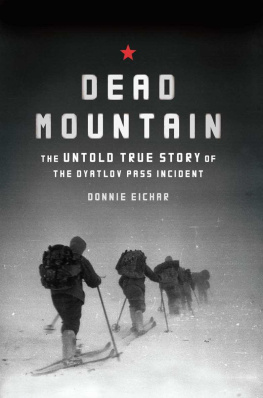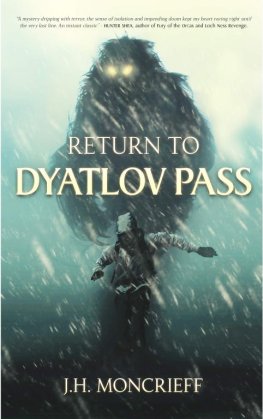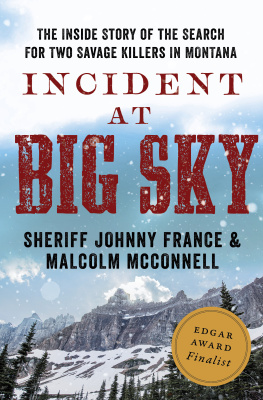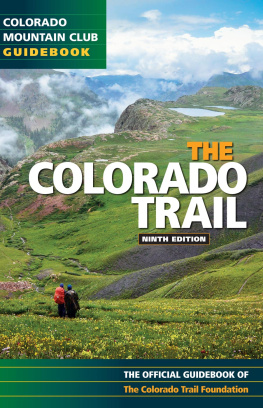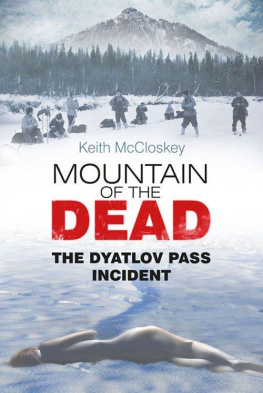Donnie Eichar - Dead Mountain: The True Story of the Dyatlov Pass Incident
Here you can read online Donnie Eichar - Dead Mountain: The True Story of the Dyatlov Pass Incident full text of the book (entire story) in english for free. Download pdf and epub, get meaning, cover and reviews about this ebook. year: 2013, publisher: Chronicle Books LLC, genre: Detective and thriller. Description of the work, (preface) as well as reviews are available. Best literature library LitArk.com created for fans of good reading and offers a wide selection of genres:
Romance novel
Science fiction
Adventure
Detective
Science
History
Home and family
Prose
Art
Politics
Computer
Non-fiction
Religion
Business
Children
Humor
Choose a favorite category and find really read worthwhile books. Enjoy immersion in the world of imagination, feel the emotions of the characters or learn something new for yourself, make an fascinating discovery.
- Book:Dead Mountain: The True Story of the Dyatlov Pass Incident
- Author:
- Publisher:Chronicle Books LLC
- Genre:
- Year:2013
- Rating:5 / 5
- Favourites:Add to favourites
- Your mark:
- 100
- 1
- 2
- 3
- 4
- 5
Dead Mountain: The True Story of the Dyatlov Pass Incident: summary, description and annotation
We offer to read an annotation, description, summary or preface (depends on what the author of the book "Dead Mountain: The True Story of the Dyatlov Pass Incident" wrote himself). If you haven't found the necessary information about the book — write in the comments, we will try to find it.
Donnie Eichar: author's other books
Who wrote Dead Mountain: The True Story of the Dyatlov Pass Incident? Find out the surname, the name of the author of the book and a list of all author's works by series.
Dead Mountain: The True Story of the Dyatlov Pass Incident — read online for free the complete book (whole text) full work
Below is the text of the book, divided by pages. System saving the place of the last page read, allows you to conveniently read the book "Dead Mountain: The True Story of the Dyatlov Pass Incident" online for free, without having to search again every time where you left off. Put a bookmark, and you can go to the page where you finished reading at any time.
Font size:
Interval:
Bookmark:

Igor Dyatlov, 19361959


Holatchahl mountain (a.k.a. Dead Mountain), 1959. The location of the Dyatlov tent is in the middle right of the frame.

To my son Dashiel,
never stop wondering.
And to my beautiful Julia,
without you it would not be.
I love you .
D.E .
Text copyright 2013 by DONNIE EICHAR.
Photographs courtesy of the Dyatlov Foundation,
copyright 2013.Used by permission.
All rights reserved. No part of this book may be reproduced
in any form without written permission from the publisher.
ISBN: 978-1-4521-2956-3
The Library of Congress has previously cataloged this title under
Eichar, Donnie, author.
Dead Mountain: the untold true story of the Dyatlov Pass incident / by
Donnie Eichar.
pages cm
ISBN 978-1-4521-1274-9
1. Hiking Russia (Federation) Ural Mountains Region. 2. Eichar,
Donnie Travel Russia (Federation) Ural Mountains Region. 3. Mountaineering
accidents Russia (Federation) Ural Mountains Region 20th
century. 4. Ural Mountains Region (Russia) History 20th century. I.
Title.
GV199.44.R82U734 2013
914.743 dc23
2013014843
Poem and song translations by Eugene Alper. Snow copyright 1958
Aleksandr Gorodnitsky, translation presented by permission.
Designed by EMILY DUBIN
Map by TIM TOMKINSON
Typeset by HOWIE SEVERSON
Chronicle Books LLC
680 Second Street
San Francisco, California 94107
www.chroniclebooks.com
CONTENTS
If I could ask God just one question it would bewhat really happened to my friends that night? YURI YUDIN

AUTHORS NOTE
The following account is based on years of research into the case of the Dyatlov hikers. All facts are derived from the criminal case files in the Soviet archives, the hikers own journals and photographs, and interviews conducted in Russia with the hikers friends and family, as well as with those involved in the search efforts. This has been supported by interviews with scientists and various experts on the case. This book would not have been possible without the invaluable assistance of Vladimir Borzenkov, Yuri Kuntsevich and Yuri Yudin. When we set out to retrace the Dyatlov groups final steps in the winter of 2012, we had one goal: to piece together the truth of this half-century-old Russian mystery.

Prologue
FEBRUARY 1959 NORTHERN URAL MOUNTAINS, USSR
TWO FIGURES TRUDGE ACROSS A SNOWY EXPANSE. THE peak of Otorten Mountain stands icy and grim in the distance, a lone witness to their miserable progress. It is afternoon, though difficult to say how late. Time of day tends to lose its meaning in this wilderness, where the sun is a mere smudge behind cloud cover, and the haze is so pervasive as to make earth and sky indistinguishable. The pair push forward into the headwind, their bundled bodies a fleck of punctuation on this vast, wintry page.
The men are university students in search of friends who have been missing ten days. They tell themselves that this is a rescue mission, not a recovery. After all, the nine missing hikersseven men, two womenare highly accomplished, having completed numerous mountaineering expeditions into this region. In fact, the missing are members of the most esteemed hiking group at their school, and there is no reason to believe that they are not alive, counting the days until rescue. Perhaps the two men imagine a reunion of schoolmates just ahead, beyond the next snowdrift.... But, other than the occasional dwarf pine, there is nothing to see.
The sun is dropping. The searchers dont have much time before they must turn around and rejoin the rest of the team at base camp. Weather conditions are volatile in the northern Uralssnow can fly in fast and thick without warning, and hurricane-force winds are a persistent menace. Though the morning had given them clear skies, threatening clouds have since collected, and the wind is already whipping snow from the ground in prelude to a storm. It looks as if it may be another day lost. But then, through the disorienting blur, the men spy something that is neither rock nor treea dark, gray shape. As they draw closer, they find a flapping tent. Though its twin poles stand obediently in the wind, a section of the tarpaulin has surrendered under the weight of recent snows.
Conflicting thoughts of relief and horror flood the searchers minds as they approach. They shout for their friends, but there is no reply. They pass an ice ax sticking out of the snow. Then a half-buried flashlight left in the on position, its battery spent. One of the men moves toward the partially snowbound entrance. The tent is a thick, canvas fortress, outfitted with a triple barrier of fabric and fasteners designed to keep out wind and cold. As the young man begins to clear away the snow, his companion looks for a faster way inside. He picks up the ice ax and, in several swift motions, brings it down on the canvas, fashioning his own entrance.
The men enter the buckled tent, their eyes immediately darting over its contents. As is typical of camping in this climate, an insulating layer of empty backpacks, padded coats and blankets lines the floor and periphery. At the south end of the tents roughly 80 square feet are several pairs of ski boots. Six more pairs sit along another wall. Near the entrance lie a wood ax and saw. Most everything else has been stowed away in packs, but a few personal objects are visible: a camera, a can of money, a diary. The men share a wave of relief as they realize there are no bodies. But there is something curious about the place, the way everything is arrangedthe ski boots standing in disciplined formation, the bags of bread and cereal positioned sensibly in one corner. The stove is in the center of the tent, not yet assembled, and an open flask of cocoa sits frozen nearby as if waiting to be reheated. There is also a cloth napkin bearing neat slices of ham. The entire arrangement gives the distinct impression of someone having tidied very recently, and, if not for the collapsed tarpaulin, one might expect a lively band of campers to return at any moment, kindling bundled in their arms.
The men step back into the snow to consider their discovery. They give in to a moment of cautious celebration, comforted in the idea that their comrades have not perished, but are out there somewhere, perhaps in a snow cave. As the two scan the immediate landscape, not once does it cross their minds that a forsaken camp is cause for anything but hope. Yet they cannot begin to fathom the conditions that must have compelled their friendsall nine of themto abandon their only shelter and vanish into the stark cruelty of the Russian wilderness.

2012
IT IS NEARLY TWENTY BELOW ZERO AS I CRUNCH THROUGH knee-deep snow in the direction of Dyatlov Pass. Its the middle of winter and I have been trekking with my Russian companions through the northern Ural Mountains for over eight hours and Im anxious to reach our destination, but its becoming increasingly difficult to put one foot in front of the other. Visibility is low, and the horizon is lost in a milky-white veil of sky and ground. Only the occasional dwarf pine, pushing through the snows crust, reminds me that there is dormant life beneath my feet. The knee-high boots I am wearingan Arctic Pro model I purchased on the Internet two months agoare supposed to be shielding my feet from the most glacial temperatures. Yet at the moment the inner toes of my right foot are frozen together, and I am already having dark visions of amputation. I dont complain, of course. The last time I expressed any hint of dissatisfaction, my guide Vladimir leaned over and said, This is Siberia . I later learn this isnt technically Siberia, only the gateway. The real Siberia, which stretches to the east all the way to the Pacific Ocean, begins on the other side of the Ural Mountains. But then Siberia, historically, has been less a geographical designation than a state of mind, a looming threatthe frozen hell on earth to which czarist and Communist Russias sent their political undesirables. By this definition, Siberia is not so much a place as it is a hardship to endure, and perhaps thats what Vladimir means when he says that we are in Siberia. I trudge on.
Next pageFont size:
Interval:
Bookmark:
Similar books «Dead Mountain: The True Story of the Dyatlov Pass Incident»
Look at similar books to Dead Mountain: The True Story of the Dyatlov Pass Incident. We have selected literature similar in name and meaning in the hope of providing readers with more options to find new, interesting, not yet read works.
Discussion, reviews of the book Dead Mountain: The True Story of the Dyatlov Pass Incident and just readers' own opinions. Leave your comments, write what you think about the work, its meaning or the main characters. Specify what exactly you liked and what you didn't like, and why you think so.

